
Cambridge International Law Journal
Scope & Guideline
Empowering legal minds with open-access scholarship.
Introduction
Aims and Scopes
- International Responsibility and Accountability:
Explores the frameworks of international responsibility, particularly in relation to state behavior and corporate accountability within international trade and investment contexts. - Public Health and International Law:
Examines the intersections of public health issues with international investment agreements, highlighting the importance of health considerations in global economic policies. - Multilingualism and Legal Interpretation:
Focuses on the challenges of language and translation in international law, particularly in treaty interpretation and the implications for legal practice and enforcement. - Global Security and Economic Law:
Investigates the evolving nature of international economic law in the context of global security challenges, including the role of the EU and the impact of sanctions. - Environmental Governance:
Addresses international legal frameworks governing environmental issues, particularly in relation to marine biodiversity and renewable energy technologies. - Interdisciplinary Approaches:
Encourages interdisciplinary perspectives in analyzing international law, incorporating insights from economics, political science, and cultural studies.
Trending and Emerging
- Corporate Accountability in International Law:
There is an increasing emphasis on the role of corporations in international law, particularly concerning their accountability in trade agreements and the implications for human rights and environmental standards. - Climate Change and International Law:
Climate change is becoming a central theme, with discussions on systemic integration in climate cases and the legal frameworks necessary to address environmental challenges. - Innovation and Technology in Law:
Emerging technologies, such as artificial intelligence and large language models, are gaining traction in legal discourse, particularly regarding their implications for treaty interpretation and international legal frameworks. - Intersection of Law and Public Health:
The interaction between health issues and international law is increasingly recognized, particularly in the context of investment agreements and responses to global health crises. - Securitization of Economic Law:
The trend toward viewing economic law through the lens of security is emerging, highlighting the need for legal frameworks that address economic stability and security concerns in a globalized world.
Declining or Waning
- Traditional Human Rights Issues:
There appears to be a decline in the volume of papers specifically addressing traditional human rights issues, with a shift towards integrating these themes within broader discussions of international security and economic law. - State Sovereignty vs. International Cooperation:
Discussions solely centered on state sovereignty without consideration of cooperative frameworks seem to be waning, as the journal increasingly emphasizes collaborative approaches to global challenges. - Historical Perspectives in International Law:
Papers that focus on historical analyses of international law seem to be decreasing, as contemporary issues take precedence over historical discourse.
Similar Journals

Northwestern Journal of International Law & Business
Advancing the Dialogue at the Crossroads of Law and BusinessThe Northwestern Journal of International Law & Business, published by the NORTHWESTERN UNIVERSITY SCHOOL OF LAW, serves as a critical platform for scholarly discourse at the intersection of law and international business. With an ISSN of 0196-3228, this journal covers a diverse range of topics relevant to practitioners and academics alike, encouraging in-depth analysis and debate surrounding contemporary issues in international legal frameworks and business practices. While currently categorized in the Q4 quartile across multiple fields including Business and International Management, Law, and Strategy and Management, it presents a unique opportunity for contributors to elevate their work within an evolving landscape. The journal's accessibility options cater to a variety of readers, fostering a rich exchange of ideas among researchers, students, and professionals dedicated to the advancement of international law and business scholarship. By publishing rigorous research and original insights, the Northwestern Journal aims to influence the academic community and inform policy-making processes worldwide, thus proving its value in the global academic discourse.

Leiden Journal of International Law
Navigating the complexities of global legal systems.Leiden Journal of International Law, published by Cambridge University Press, stands as a leading platform for scholarly discourse in the fields of international law and political science. With its ISSN 0922-1565 and E-ISSN 1478-9698, the journal has established a significant academic presence since its inception in 1988, upholding rigorous standards through a robust peer-review process. The journal is notable for its impressive impact factor, categorizing it in the Q1 quartile for law and Q2 for political science and international relations, indicating its widespread influence and recognition among scholars. As a vital resource for researchers and practitioners, the journal contributes to the advancement of legal scholarship and promotes critical discussions surrounding contemporary international issues. Although it operates under a traditional subscription model, its comprehensive analyses and critical insights make it an essential read for those engaged in the interdisciplinary examination of law and global governance. The journal is headquartered in Cambridge, England, and continues to play a pivotal role in shaping the discussions that define the contemporary landscape of international law.

University of Pennsylvania Journal of International Law
Navigating the Complexities of Global JurisprudenceThe University of Pennsylvania Journal of International Law is a pivotal academic publication that serves as a forum for groundbreaking legal scholarship, particularly in the complex and dynamic field of international law. Published by the University of Pennsylvania Law School, this journal supports a diverse array of interdisciplinary research and discourse, capturing insights that bridge legal, economic, and political landscapes. As of 2023, it is positioned in Quartile 3 in Law and Quartile 4 in Economics according to Scopus rankings, underscoring its relevance and contributions to legal academia. The journal is accessible through conventional methods, with its physical presence anchored in Philadelphia, Pennsylvania. With a commitment to fostering dialogue on both emerging and traditional legal issues, the journal aims to engage scholars, practitioners, and students alike, encouraging contributions that enrich understanding and drive progressive legal thought. This commitment to academic excellence ensures that the University of Pennsylvania Journal of International Law remains a vital resource for those seeking to navigate the challenges of international legal frameworks.
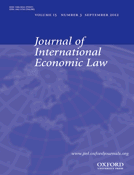
JOURNAL OF INTERNATIONAL ECONOMIC LAW
Innovating Understanding of Global Economic PoliciesWelcome to the JOURNAL OF INTERNATIONAL ECONOMIC LAW, a prestigious academic journal published by Oxford University Press, dedicated to the interdisciplinary exploration of the intricate relationship between law and economics on a global scale. Since its inception in 1998, this quarterly journal has developed a reputation for excellence, currently holding a Q1 ranking in both Economics, Econometrics and Finance and Law categories. With an impressive Scopus ranking that places it in the 94th percentile for law and the 82nd percentile for economics, it serves as an essential resource for researchers, professionals, and students aiming to advance their understanding of international economic regulations and policies. Our goal is to foster scholarly dialogue and inform legal practices by publishing cutting-edge research, critical reviews, and comprehensive analyses relevant to contemporary issues in international economic law. Although the journal maintains subscription-only access, it remains a crucial platform for disseminating influential ideas and practices within the global academic community, encouraging rigorous debate and innovative thinking in this dynamic field.
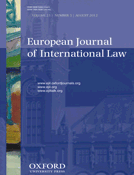
European Journal of International Law
Exploring innovative research in law and political science.The European Journal of International Law (EJIL), published by Oxford University Press, stands as a leading platform for the dissemination of innovative research in the realms of International Law and Political Science. With an impressive ISSN of 0938-5428 and E-ISSN of 1464-3596, this prestigious journal has achieved Q1 rankings in both Law and Political Science and International Relations categories as of 2023, emphasizing its significance among contemporary scholarly publications. Spanning contributions from a diverse range of disciplines, the EJIL serves as an essential resource for researchers, professionals, and students alike, promoting critical dialogue on pressing international legal issues. Although currently not offered as an open-access journal, it continues to retain a high impact factor, as evidenced by its substantial Scopus rankings, placing it within the top percentiles in multiple categories. Its commitment to scholarly excellence is reflected in a convergence of research trends from 2005 to 2024, and it remains dedicated to fostering informed discourse on global legal frameworks and their implications.

JOURNAL OF CONFLICT & SECURITY LAW
Fostering Insight into Conflict and Security LegislationThe Journal of Conflict & Security Law, published by Oxford University Press, is an essential source of scholarly information in the fields of law, conflict studies, and security policy. With an ISSN of 1467-7954 and an E-ISSN of 1467-7962, this journal has been a significant platform for rigorous academic discourse since its inception in 2005. It is recognized for its contributions to the legal frameworks surrounding conflict and security, currently holding a Q3 ranking in Law and Q4 in both Safety Research and Safety, Risk, Reliability, and Quality for the year 2023. With its Scopus rankings placing it in the 61st percentile in Social Sciences Law, the journal serves as a key reference point for researchers and professionals looking to navigate the complexities of contemporary security challenges. Though the journal is not open access, its detailed analyses are critical for informed policy-making and academic inquiry, making it indispensable for students, scholars, and practitioners alike. For comprehensive insights and empirical studies, Journal of Conflict & Security Law remains at the forefront of legal and security research.
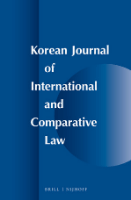
Korean Journal of International and Comparative Law
Illuminating the path to legal understanding across cultures.Welcome to the Korean Journal of International and Comparative Law, an esteemed publication dedicated to advancing the understanding of international and comparative legal frameworks. Published by BRILL, a reputable publisher known for its commitment to scholarly excellence, the journal serves as a vital resource for researchers, professionals, and students interested in exploring the nuances of legal systems across borders. With an ISSN of 2213-4476 and an E-ISSN of 2213-4484, the journal aims to foster scholarly dialogue through the dissemination of high-quality research. Although not an open access journal, it provides subscription-based access to its compelling articles that tackle pressing legal issues in an increasingly interconnected world. The Korean Journal of International and Comparative Law serves as a significant platform for innovative legal scholarship and critical discussions, making it an essential resource for those engaged in the legal sciences.
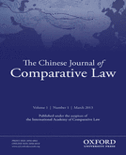
Chinese Journal of Comparative Law
Enhancing Understanding of Law in a Global ContextWelcome to the Chinese Journal of Comparative Law, a premier academic journal dedicated to the field of comparative law, published by Oxford University Press. Since its inception in 2013, the journal has provided a crucial platform for scholars and practitioners to engage with the intricacies of legal principles across different jurisdictions, emphasizing both traditional and contemporary issues relevant to the field. With an impact factor reflecting its influence—ranked Q2 in Law and Q3 in Economics and Econometrics—the journal continues to foster innovative research and dialogue among legal professionals. The Scopus rank positions it well within the top 69th percentile of law journals, illustrating its significant contribution to the social sciences. While not open access, the journal's commitment to disseminating high-quality, peer-reviewed research ensures it remains an essential resource for researchers, practitioners, and students interested in the evolving landscape of comparative law. As the journal converges through 2024, it invites contributions that not only challenge existing paradigms but also enhance the understanding of law in a global context.

Chinese Journal of Environmental Law
Exploring Environmental Law in a Changing ChinaChinese Journal of Environmental Law, published by BRILL, is a leading interdisciplinary journal that focuses on the intersection of environmental issues and legal frameworks within the context of China and beyond. With an ISSN of 2468-6034 and an E-ISSN of 2468-6042, it has been a vital contribution to the field since its inception in 2017. The journal aims to provide a platform for researchers, policy-makers, and practitioners to discuss and analyze the evolving landscape of environmental law, particularly in the context of management and policy implications. Notable for its academic rigor, it holds a Q2 ranking in Law and a Q3 ranking in Management, Monitoring, Policy and Law. In 2023, the journal was ranked at #516 out of 1025 in Social Sciences - Law and #328 out of 399 in Environmental Science. Although not open access, it is accessible through various academic institutions, making it a critical resource for anyone interested in shaping sustainable legal practices. The Chinese Journal of Environmental Law is set to continue its convergence of knowledge through 2024, reflecting its commitment to publishing cutting-edge research that influences both policy and practice.
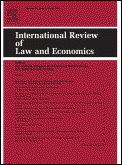
INTERNATIONAL REVIEW OF LAW AND ECONOMICS
Connecting Legal Frameworks with Economic Principles.The INTERNATIONAL REVIEW OF LAW AND ECONOMICS, published by Elsevier Science Inc, stands as a premier academic journal dedicated to the interdisciplinary exploration of law and economics since its inception in 1981. With an impressive convergence of insightful research and theoretical advancement, the journal encapsulates critical findings that bridge legal studies and economic principles. Ranked in the Q2 category for Economics and Econometrics and Finance, alongside a notable Q1 ranking in Law, it highlights its significant influence and high-quality scholarship within the academic community. The journal is indexed in Scopus, achieving commendable rankings which reflect its importance, ranking #188 out of 1025 in Law and #343 out of 716 in Economics and Econometrics. With no Open Access option specified, readers are encouraged to engage with the content through institutional access or subscription. This journal is essential reading for researchers, practitioners, and scholars looking to deepen their understanding of how legal frameworks intersect with economic theories, making it a vital resource in both fields.